

Has Google’s Author Rank Arrived? Please, stop talking about AuthorRank. Please, stop talking about AuthorRank Last month I had the pleasure to talk at ISS London and to attend SMX.
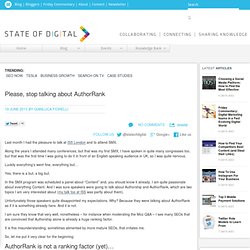
Along the years I attended many conferences, but that was my first SMX; I have spoken in quite many congresses too, but that was the first time I was going to do it in front of an English speaking audience in UK, so I was quite nervous. Luckily everything’s went fine, everything but… Yes, there is a but, a big but. In the SMX program was scheduled a panel about “Content” and, you should know it already, I am quite passionate about everything Content. Unfortunately those speakers quite disappointed my expectations. I am sure they know that very well, nonetheless – for instance when moderating the Moz Q&A – I see many SEOs that are convinced that Authorship alone is already a huge ranking factor. It is this misunderstanding, sometimes alimented by more mature SEOs, that irritates me.
So, let me put it very clear for the beginning: Author Rank: A Step-by-Step Guide to Dominating Search with Content Marketing. Want a 150% Boost in Traffic? Then Use This Idiot-Proof Guide to Google Authorship Markup. Using AuthorRank To Future-Proof Guest Posting. Look how excited Google are by authorship.

How can you not love his little face? There is a problem with guest blogging: SEOs have got hold of it. As with almost every link building method known to man, if there is a way to scale a process, SEOs will find it. Whilst there is nothing wrong with scalable methods per se, they are often irrevocably linked to a decrease in quality. Good SEOs will be able to maintain quality and use guest posts properly – as a means to build brand exposure and leverage new audiences, attracting qualified traffic as well as links – however, there will be plenty of SEOs who won't.
We get guest post pitches for our website all the time, and have recently noticed a drop in the quality of both the outreach and the content itself. I urge you to go and read the full post and comments as it highlights the issue better than I ever could, with reaction from some prominent SEOs. When he sent the piece through, it could be described 'article quality' at best.
Author Rank, SEO and Google Plus: What you need to know. Google has given Internet marketers a new way to prove page quality and authority.
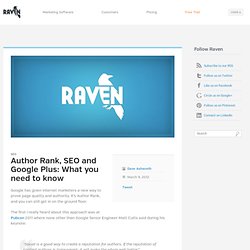
It’s Author Rank, and you can still get in on the ground floor. The first I really heard about this approach was at Pubcon 2011 where none other than Google Senior Engineer Matt Cutts said during his keynote: “Social is a good way to create a reputation for authors. If the reputation of content authors is transparent, it will make the whole web better.” It is therefore with great interest that we see Google pushing Author Rank as they begin to highlight content creators within their search results. With Author Rank, Google wants to make it easier for users to find the work of specific writers, and leverage its ability to use authors as an element for ranking pages and sites. This is promising for a few reasons. Author Rank is also relatively new, which means the proactive amongst us have a great opportunity while the SERPs aren’t yet saturated with author profiles yet. Rel="author" and rel="me" in WP and other platforms. AuthorRank could be bigger than all Panda updates combined.
AuthorRank could be more disruptive than all of the Panda updates combined.
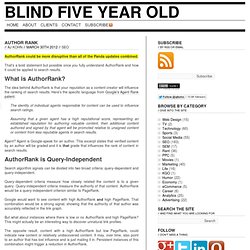
Authorship - Webmaster Tools Help. We're listening.
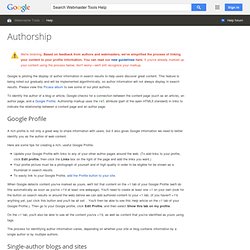
Based on feedback from authors and webmasters, we've simplified the process of linking your content to your profile information. You can read our new guidelines here. If you've already marked up your content using the process below, don't worry—we'll still recognize your markup. Google is piloting the display of author information in search results to help users discover great content. This feature is being rolled out gradually and will be implemented algorithmically, so author information will not always display in search results.
How to Prepare for AuthorRank and Get the Jump on Google. What Author Rank Is If you're like me and you have your finger on Google’s pulse on a daily basis, you’ve undoubtedly heard of Author Rank.
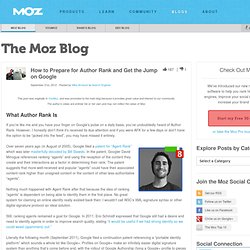
However, I honestly don’t think it’s received its due attention and if you were AFK for a few days or don’t have the option to be “jacked into the feed”, you may have missed it entirely. Over seven years ago (in August of 2005), Google filed a patent for “Agent Rank” which was later masterfully decoded by Bill Slawski. In the patent, Googler David Minogue references ranking “agents” and using the reception of the content they create and their interactions as a factor in determining their rank. The patent suggests that more well-received and popular “agents” could have their associated content rank higher than unsigned content or the content of other less-authoritative “agents”.
Nothing much happened with Agent Rank after that because the idea of ranking “agents” is dependent on being able to identify them in the first place.